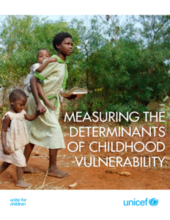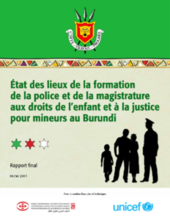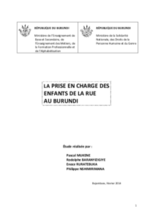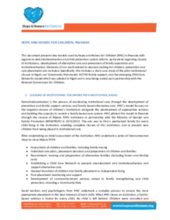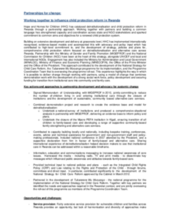Displaying 1251 - 1260 of 1622
The aim of this audit was to assess how the Ministry of Gender, Labour and Social Development (MOGLSD) is handling the current adoption process of children leaving in a bid to protect their rights and welfare.
This study by UNICEF sought to identify key determinants of vulnerability among children –including those affected by HIV and AIDS – that can contribute to developing an improved global measure of vulnerable children in the context of HIV and AIDS. Data from the most recent available household surveys at the time of analysis was used from 11 countries – Cambodia, Central African Republic, Haiti, Malawi, Rwanda, Sierra Leone, Swaziland, Uganda, United Republic of Tanzania, Zambia and Zimbabwe – were pooled.
A presentation on the "Orphan Industrial Complex" at the Young Lives and Globalization in Africa workshop at the University of Liège, Belgium on 21st February 2014.
The Ministry of Public Service, Labour and Social Welfare’s Department of Child Welfare and Probation Services in Zimbabwe is inviting applications from suitably qualified and experienced individuals or organisations to undertake a Baseline Survey on Children Deprived of Parental Care Living in Residential Child Care Facilities.
Ce rapport documente une initiative visant à assurer la sécurité et la justice au Burundi acteurs de la protection des enfants et la formation aux droits de l'enfant, dans le cadre d'un projet régional plus large.
Ce rapport documente la situation des enfants des rues au Burundi, y compris les facteurs qui les poussent dans les rues, et analyse les initiatives nationales cadres et gouvernementales législatives en place pour soutenir leurs soins et de protec
Dans un contexte de déplacements de population à grande échelle et d’insécurité au Soudan du Sud, de nombreux enfants ont été séparés de leurs familles et de leurs communautés.
This systematic review assessed the quantitative literature to determine whether orphans are more likely to experience physical and/or sexual abuse compared to non-orphans in sub-Saharan Africa (SSA). It also evaluated the quality of evidence and identified research gaps.
This document presents key models used by Hope and Homes for Children (HHC) in Rwanda with regards to deinstitutionalisation and child protection system reform, particularly regarding closure of institutions, development of alternative care and prevention of family separation and institutionalisation.
A short brief by Hope and Homes for Children (HHC) in Rwanda explaining strategies used in the process of taking its deinstitutionalisation pilot project and research up to policy-level advocacy.


